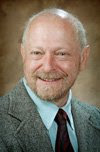I'm amazed at the paucity of principled comment about the recent (and unfortunate) arrest of African-American literateur (and Harvard professor) Gates, by Cambridge police officer Crawley, on charges of "disorderly conduct." Gates' "disorderly conduct" is described, on the charge sheet, as "loud and tumultuous behavior in a public place" - the "public place" being the porch of Gates' home, and the "behavior" being loud verbal criticism, probably inaccurate, of a police officer.
Before the essentials, though, I need to say why I tend to think that Gates' criticism of the police officer as a "racist" was inaccurate. I once knew a Jewish gentleman from a country in Central Europe that back in the 1930s practiced its own kind of "Jim Crow" against Jews; anyone who so much as "looked Jewish" was excluded from the "better" places of commerce in that country well into the 1980s. Like many American immigrants from Central Europe, my friend favored shorts in the summer. And, looking for a good place to eat lunch, was often stopped at the door, and told that shorts were not considered acceptable attire in the restaurant that had caught his fancy. On those occasions he was certain that he had been stopped at the door because he "looked Jewish" - even though the same restaurant would welcome him with a smile in winter, when he wore slacks.
When dealing with people who had faced racism in the past, a competent police officer will take the context and effects of their experience into account. Gates, unfortunately, permitted his experience - his first faculty job was in a part of America where racism was common and assumed - to bias his judgment. He probably owes Officer Crowley an apology for inaccurate criticism - or would owe Officer Crowley an apology if Officer Crowley had not taken Gates' error as cause for arrest.
Of course there are, even by the most stringent standard of individual rights, contexts in which loud speech can be objectively criminal. But, outside the context of fraud, or of violations of intellectual property, any legitimate regulation of non-governmental speech must be strictly content-neutral. In a free society, there is only a small set of contexts in which non-governmental speech can be a cause for arrest:
1. The speaker uses a private platform belonging to someone else without the owner's consent. Gates spoke from the porch of his own home, so this is not relevant here.
2. The expression interferes with the process of justice. Gates was not in a courtroom during a trial, and in any case a policeman is not a judge. A policeman is a specialized emergency worker, trained to keep a cool head even in contingencies far more disturbing than loud and inaccurate verbal criticism from an unarmed and otherwise innocuous citizen. So this is not the case here either.
3. The expression invades the property of others and interferes with their other rights. For example, shouting loudly at night, when the noise would disturb the sleep of one's neighbors, might be criminal. But it was daytime, and no one (other than the arresting officer) was irritated by the noise. So again, no cause for arrest.
4. The delivery of a credible threat. Not the case here, and not even alleged.
5. The proverbial "shouting fire:" speech that, in context, can cause a crowd to panic and stampede; or perhaps the incitement of an unruly crowd to a lynching or a riot. But there was no crowd; the handful of non-police onlookers at the scene were outnumbered by uniformed police.
So what was it, about Gates' conduct, that could possibly have crossed the line into "disorderly," meaning "criminal," action? Objectively, nothing. Subjectively, the arresting officer may have perceived Gates' speech as repulsive and insulting. But this is hardly enough reason for a professional public servant, sworn to defend the rights of the people, including the free speech rights of Professor Gates, to arrest Professor Gates for nothing beyond loud and insulting verbal criticism of a government employee, even when that criticism was publicly delivered, on Professor Gates' porch, in that employee's face.
One mark of a Police State, is that one may not speak ill of a police officer without risking arrest. Where is the First Amendment when we need it?
Saturday, July 25, 2009
Subscribe to:
Post Comments (Atom)


2 comments:
In a better society, this is what newspapers would be printing. They waste so many words failing to explain the principles behind current events as you have just done with this one in a couple paragraphs. I felt it would be unjust to not praise such clear, focused writing.
-Jason Goldsmith
Of relevance:
http://hnn.us/blogs/entries/112250.html
A blogger arrested for identifying a police officer! Police state indeed
Post a Comment